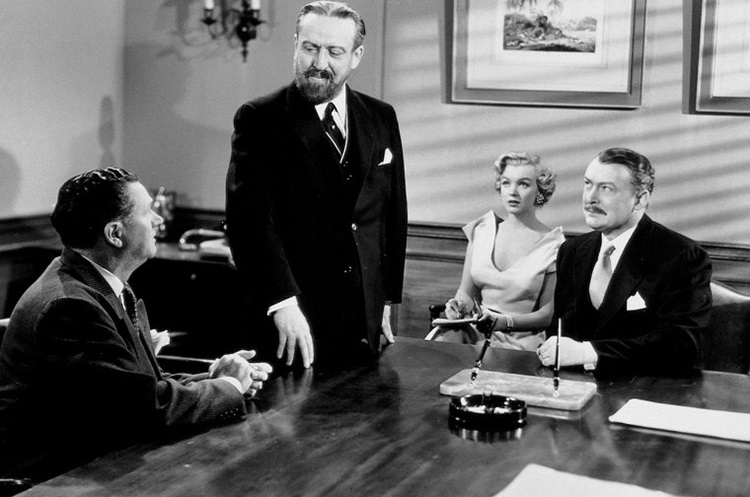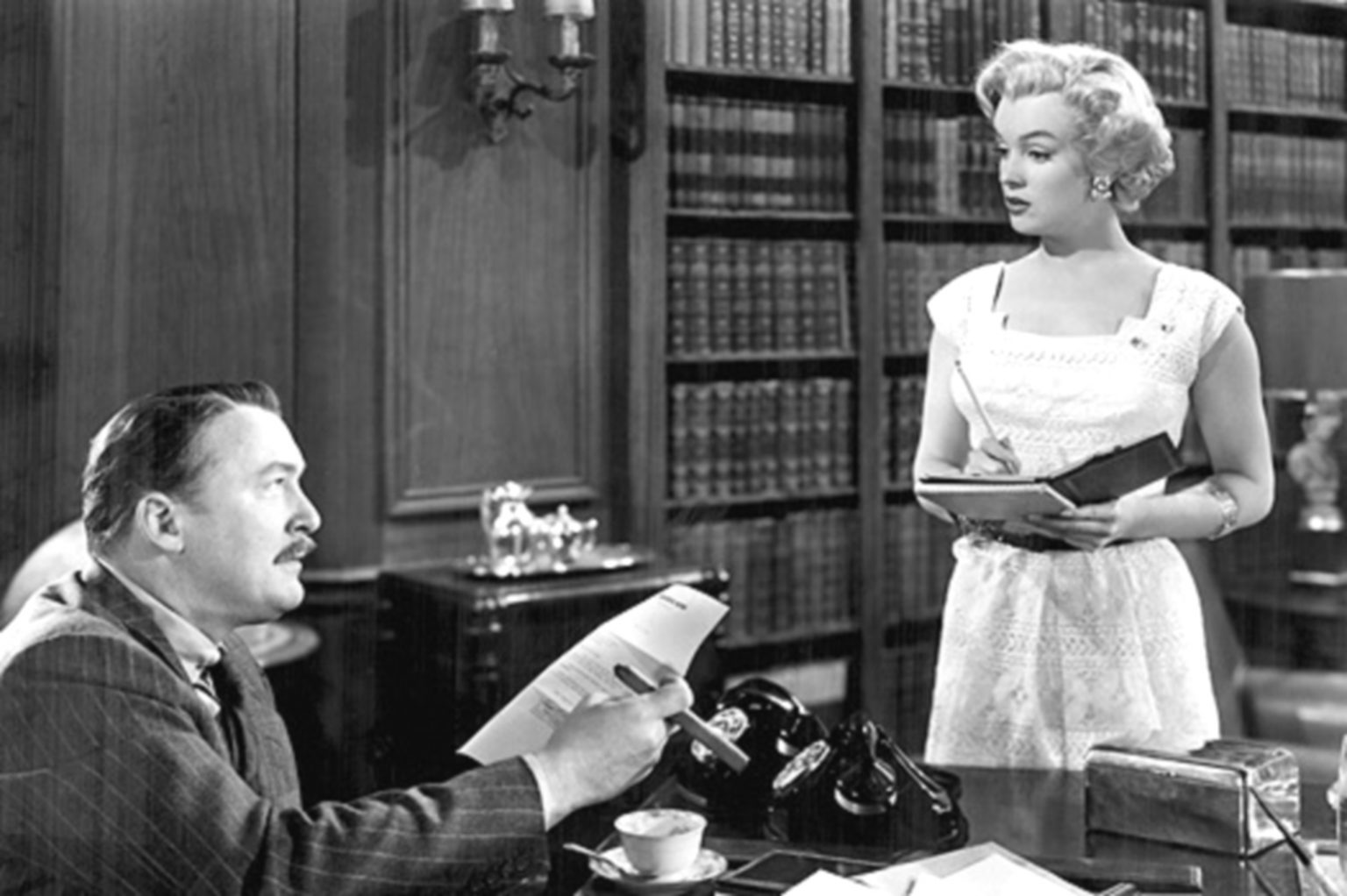As Young As You Feel
15 June 1951
Marilyn’s Silly Secretary Trilogy, Movie No. 2

Many of us labor all our lives, scrimp, save, invest money in various retirement vehicles, like stocks, bonds and annuities, in anticipation of the day when our retirement will become official. Then, the golden years of our lives, as those final years are euphemistically called, will be spent on golf courses, visiting grandchildren or traveling around in our well appointed mobile home. Yes sir, those will be the best days of our lives, or so we believe. And yet, there are some among us who think and feel differently about retirement. To them retirement represents a time of desuetude, boring inactivity and feelings of uselessness.
Such is the painful and curious case of John Hodges, the central character in the odd comedy, As Young As You Feel. For many years, John has operated a hand press for Acme Printing. He loves his job: it is very important to him. Along with playing the piccolo in the local orchestra, one sponsored by his employer, his job gives his life meaning and dignity. His forced retirement, at age sixty-five, due to Acme’s asinine retirement policy, leaves him depressed but not defeated.
John lives with his family: his son, George; George’s loquacious wife, John’s daughter-in-law, Della; and his darling granddaughter, Alice. Alice is betrothed to Joe Elliott. Joe is also an employee of Acme Printing. He is waiting to receive a promotion before he will marry Alice: he must be able to support her comfortably.
When John informs his family that Acme forced him into retirement and therefore, an unemployed status, they are stunned. They are not sure what grandpa will do with himself or how they will recoup his lost income. But grandpa is an unusually bright, articulate fellow, spry for his age, and he decides not to accept forced retirement and desuetude passively. He learns that Acme Printing is just one of the many subsidiaries owned by a huge corporation, Consolidated Motors. He also discovers that the man at the very tiptop of Consolidated Motors is Harold P. Cleveland, President. None of the employees in Acme’s personnel department seem to know anything about Mr. Cleveland, including his appearance; so John’s fertile mind hits upon the scheme of impersonating president Cleveland and altering Acme’s retirement policy.
The crafty printer hoodwinks the uninformed executives at Acme, delivers quite an inspirational speech at a Chamber of Commerce luncheon, changes the overall mood of the nation, positively impacts the stock market and, of course, gets his job back. In As Young As You Feel, a job, even if it is a $65 dollar a week gig standing at a hand-press, is something for which a man should fight, even deceive a nation and risk incarceration, to retain. My my how times have changed.
Even if I tried, I could not dislike As Young As You Feel. Even though the central story may stretch one’s credulity, it’s still relatively funny and entertaining, if not sugary sweet and sentimental. Admittedly, some significant subplots, job security, aging, retirement, infidelity, taking risks, choosing security over love in a marriage, just to mention a few, come and go in this movie. They deserved a serious examination, more than they get in our common man impersonates important man movie. But any movie made in the fifties was going to be limited and hampered by the Production Code and censorship. Besides, I can’t fault a light comedy for looking at the dramatic aspects of life with humor. After all, real life is an odd blend of the funny and the dramatic and often it is difficult to discern one from the other.
Monty Woolley as a factory worker, I must admit, was tough for me to accept although he plays the character ardently and deftly. With his expertly manicured, white beard, he looks more like a university professor, a poet or a wise philosopher and comports himself likewise. Some of the thoughts he expresses as spontaneous dialogue are mighty lofty and he delivers them with the requisite emotion and poetic loftiness. While he may have planned just to get his old job back, he gets slightly more when Lucille, the wife of Acme’s director and president, becomes infatuated with him. In fact, Lucille’s infatuation puts a new bounce into his gait and a provides his with a new outlook on his life.
Thelma Ritter delivers her usual energetic and humorous performance as John’s loquacious daughter-in-law, a slightly dissatisfied and victimized woman whose vaudevillian past represents the better, happier years of her life. She has a scrapbook that memorializes those departed years.
I’m prepared to admit that I am not a big fan of David Wayne and if pressed on the issue, I’m prepared to admit, also, that in my mind he will always be Dr. Charles Dutton, the aging research scientist from The Andromeda Strain, Digger Barnes from CBS’ soap opera, “Dallas” or Blanche Elizabeth Marie Hollingsworth Devereaux’s father, Big Daddy, from “The Golden Girls”. I admit he is a relatively decent actor. He studied at The Actor’s Studio, although Lee Strasberg’s Method apparently didn’t have the desired effect on David: he always appears to be acting for an audience. With regard to his part in this movie, he does a respectable job with a boring character but honestly, I don’t see him as a fitting fiancé or husband for the lovely Alice, played by the lovely Jean Peters; but then, I am just jealous.
Jean Peters plays the part of John’s loving and beautiful granddaughter well; but I had a hard time believing a woman as attractive as she could not land a man with better features than David Wayne or a man who is willing to wed her whether he gets a promotion or not. She claims to love Joe because he has character; but when they are together, she appears to be conflicted. When Joe announces that he saw, with his own two eyes, grandpa impersonating the president of Consolidated Motors and provides a newspaper photograph as proof, Alice accuses him of drunkenness while Della calls him a lunatic who sees things in newspapers. Really? Obviously the man in the newspaper’s photograph is grandpa. Darkening his beard might be an effective disguise that is able to deceive those not familiar with him; but the beard-darkening-tactic would not fool any member of his family.
The best performance, though, for my dime, comes from Constance Bennett as Lucille McKinley. She is touching and very convincing as an aging but still lovely, slightly disappointed but sensitive woman who settled for security in her marriage. She is still trying to convince herself that the man to whom she has been married for twenty years loves her, still trying to convince herself that she loves him. I accepted her impulsive behavior, her sudden willingness to cast aside twenty years of marriage because her husband is such a lout.
And that leads me to the one despicable character in the movie, Louis McKinley. The performance delivered by Albert Dekker as the irascible Mr. McKinley, if anything, is certainly enthusiastic; and he convincingly renders Louis as a crude, rude and unattractive man. It’s certainly understandable why a woman as sensitive as Lucille might want to get away from him. Yet, the movie is unclear, and therefore I am still unsure, about Louis’ relationship with Harriet, his beautiful secretary. And that brings me to Marilyn’s role.

Like Marilyn’s role as Iris, the secretary in Hometown Story, Marilyn’s role as Harriet is primarily one of window dressing and she certainly dresses-up the scenes in which she appears. However, her role in this movie, like her role in Hometown Story, is completely nonessential; and Marilyn plays Harriet like she played Iris, as a very professional woman, slightly stern and even somewhat aloof. Is she the type of woman that would have an extra-marital affair with Mr. McKinley, as is suggested, or is Louis merely trying to draw the stern but gorgeous Harriet into a sexual fling? There is a telephone conversation between them suggesting the possibility of both. No doubt, the Production Code prohibited a more honest treatment of their relationship; but that being the case, why even bother with it? Apparently Fox, primarily Darryl Zanuck, thought Marilyn could only provide cheap titillation in superficial roles and he apparently believed that his low budget comedies needed that as a draw. The line of dialogue in which Harriet exclaims she took dictation from Mr. Cleveland is gratuitous, obviously meant as a sexual reference and as such, demeans both character and actress, not to mention that such a crude reference serves no purpose relative to the movie’s plot or Harriett. What a shame. Is there any wonder why Marilyn left Hollywood, tongue out, aimed at Zanuck and 20th Century-Fox, just a few years in the future. The fainting scene in Mr. McKinley’s office when she exposes and aims her tongue at him, then makes a defiantly cute departure, foreshadows Marilyn’s surreptitious escape to New York City. But her next silly secretary role with Archibald Alexander Leach and Virginia Katherine McMath in 1952, would be made for 20th Century-Fox.
Some final comments about an aspect or two of this movie’s screenplay that I find particularly odd. Even though father and daughter appear together in several scenes, not one word of dialogue passes between them. Alice looks at her father curiously a few times but never speaks to him. I can say unequivocally that my daughter and I could not be in each other’s company without speaking, even if we happened to be embroiled in a father-daughter dispute. In that case, the dialogue might be terse or even momentarily mean, but speak to each other we would. Also, when her father expresses a concern that he might be contracting pneumonia and sneezes, Alice remains oddly mute while Della ridicules her husband: how could he have pneumonia since he doesn’t even have a cold? Wouldn’t a caring daughter or wife suggest that the poor man at least check his temperature for fever? I believe they would.
While not a masterpiece, this movie provides a glimpse of America shortly after the end of WWII, when the government was not omnipresent, when individuality and personal responsibility, when work and the dignity of work were still potent forces in the lives of individuals who were proud to be Americans and believed in American exceptionalism. That America no longer exists and those types of Americans are quickly becoming extinct.
